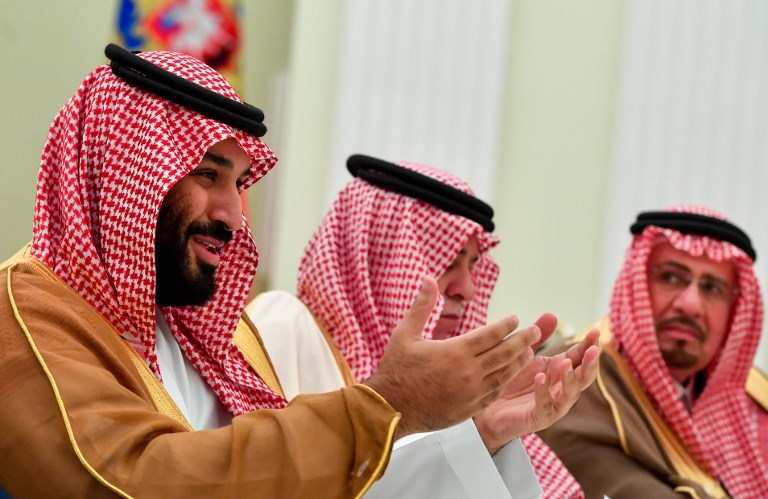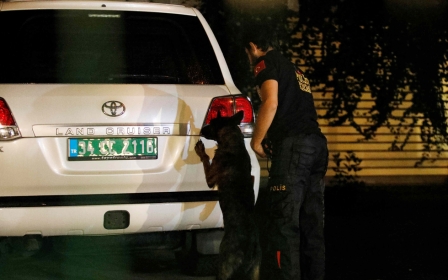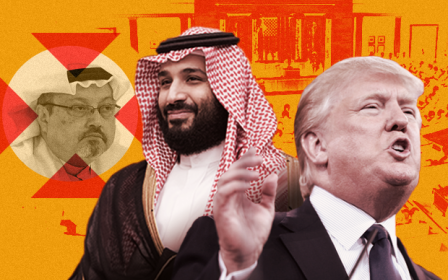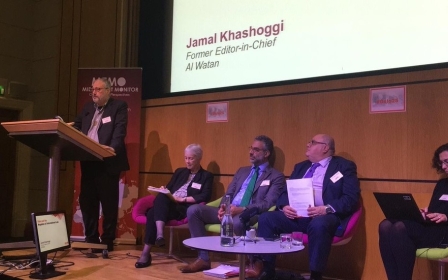'Forced to hide our names': Anonymous Saudi clerics call for bin Salman to go

A new group claiming to speak for Saudi scholars opposed to the government's "westernisation" programme of reforms has called for Crown Prince Mohammed bin Salman to be removed over the disappearance and suspected killing of journalist Jamal Khashoggi.
In statements posted on Twitter on Thursday, the Saudi Scholars Association blamed bin Salman for killing Khashoggi in a "gruesome" way which "goes against human ethics and standards".
Translation: We call on the people with the solution to turn to the competent, those who think of the good in benefitting the people and the country, in repairing the imbalance, fighting corruption and the consolidation of Islamic values in society, and called for the speedy release of detainees of scholars, preachers and reformers.
It said Saudi Arabia faced "crises and problems” because of “injustice and unfair policies that MBS is responsible for," using an acronym for the crown prince.
It cited the arrests of "religious scholars, preachers and writers" and blamed bin Salman for "spreading social and administrative corruption with incompetence, and wasting public money on what is not useful".
“And finally, the injustice he has caused by killing the journalist Jamal Khashoggi,” it added.
Khashoggi has been missing since entering the Saudi consulate in Istanbul on 2 October. Turkish investigators suspect he was killed and dismembered inside the building.
Middle East Eye reported on Wednesday that at least seven of bin Salman's personal security detail were among 15 Saudi suspects linked to the case by Turkish investigators.
Bin Salman has "totally denied any knowledge of what took place” in Istanbul, according to US President Donald Trump who spoke to the crown prince on Tuesday. Saudi officials have said that Khashoggi left the consulate soon after entering, but have not released any evidence to corroborate their account.
'Forced to hide our names'
The Saudi Scholars Association has been posting statements on Twitter since late September and claims to represent scholars, students and academics, according to earlier statements. It is not a verified account.
“Everyone can see what our country is going through today,” an earlier statement posted by the group said.
"The disorder has lead all who wish to advise either to prison or to silence. Therefore we have been forced to hide our names."
Saudi Arabia's religious establishment is usually vocal in its support for the royal family and clerics critical of the government have mostly been silenced as part of a wider crackdown on dissent.
'It is difficult to say how much this reflects the religious establishment because all the major figures who could have been remotely oppositional appear to be imprisoned'
- Usaama al-Azami, lecturer in Islamic Studies
Usaama al-Azami, a lecturer in Islamic Studies, at the Markfield Institute of Higher Education in the UK, told MEE that it was possible that young dissident clerics inside Saudi Arabia could be behind the Saudi Scholars Association but that most dissent inside the kingdom had already been quashed.
"It is difficult to say how much this reflects the religious establishment because all the major figures who could have been remotely oppositional appear to be imprisoned," said al-Azami.
Bin Salman has promoted a series of social reforms that have grabbed the attention of western media, notably lifting Saudi Arabia's longstanding ban on women drivers and allowing cinemas to open for the first time, as well as courting western investors through his Vision 2030 programme that aims to end the kingdom's economic dependency on oil.
But he has also overseen a widespread crackdown on critical voices, targeting business tycoons, opposition activists, members of the royal family and clerics - both progressive and conservative - critical of government policy.
Last month, prosecutors in Saudi Arabia demanded the death penalty for three prominent clerics detained last year, Awad al-Qarni, Ali al-Omari and Salman Odah. The three men are believed to have been arrested because they did not back bin Salman's policy towards neighbouring Qatar, which has been blockaded by Saudi Arabia and its allies since May last year.
But Azami said many lesser known clerics had also been targeted.
"A lot of smaller players, and a lot of people who have really had nothing to do with politics but had the slightest whiff of independence, have ended up in prison," he said.
Many were also afraid to use social media to criticise the crown prince amid fears that the government was monitoring online activity which is tightly regulated in the kingdom.
Saudi Arabia's religious establishment has not commented on Khashoggi's disappearance, but Abdalaziz bin Abdullah Al Sheikh, the high mufti of Saudi Arabia, said on Tuesday that the country was being targeted because it was envied for its "religion", its "safety", and its "good deeds".
Translation: This country is being envied for its religion, envied for its security, its leadership, its prosperity and good deeds, its unity. God forbid misleading propaganda.
Azami told MEE that it remained to be seen whether the statements being posted by the Saudi Scholars Association were indicative of significant levels of opposition to bin Salman inside Saudi Arabia.
"Until we actually learn who they are it might be difficult to say whether there is a genuine rebellion among the ulema [senior scholars] because that rebellion was crushed before it got off the ground by Mohammed bin Salman," he said.
"He obviously has made lots of enemies in the process of consolidating his power as ruthlessly as he has."
This article is available in French on Middle East Eye French edition.
Stay informed with MEE's newsletters
Sign up to get the latest alerts, insights and analysis, starting with Turkey Unpacked
Middle East Eye delivers independent and unrivalled coverage and analysis of the Middle East, North Africa and beyond. To learn more about republishing this content and the associated fees, please fill out this form. More about MEE can be found here.




